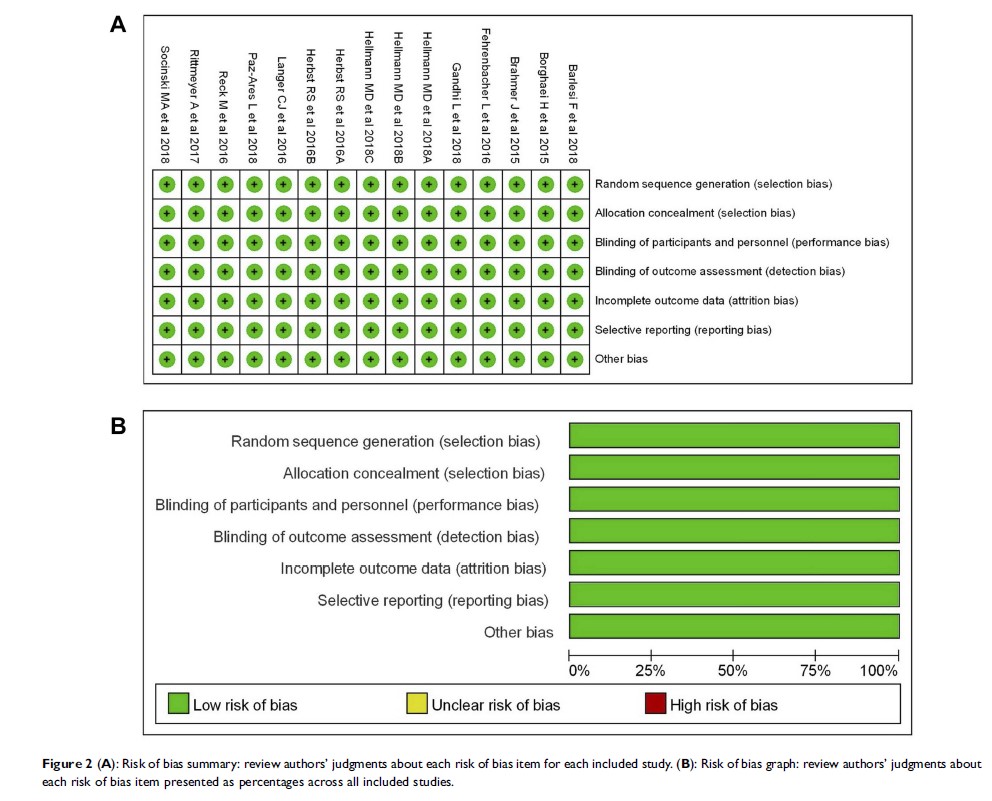9 1 2 3 6
论文已发表
注册即可获取德孚的最新动态
IF 收录期刊
- 2.6 Breast Cancer (Dove Med Press)
- 3.9 Clin Epidemiol
- 3.3 Cancer Manag Res
- 3.9 Infect Drug Resist
- 3.6 Clin Interv Aging
- 4.8 Drug Des Dev Ther
- 2.8 Int J Chronic Obstr
- 8.0 Int J Nanomed
- 2.3 Int J Women's Health
- 3.2 Neuropsych Dis Treat
- 4.0 OncoTargets Ther
- 2.2 Patient Prefer Adher
- 2.8 Ther Clin Risk Manag
- 2.7 J Pain Res
- 3.3 Diabet Metab Synd Ob
- 4.3 Psychol Res Behav Ma
- 3.4 Nat Sci Sleep
- 1.9 Pharmgenomics Pers Med
- 3.5 Risk Manag Healthc Policy
- 4.5 J Inflamm Res
- 2.3 Int J Gen Med
- 4.1 J Hepatocell Carcinoma
- 3.2 J Asthma Allergy
- 2.3 Clin Cosmet Investig Dermatol
- 3.3 J Multidiscip Healthc

非小细胞肺癌(NSCLC)患者 PD-1/PD-L1 相关性腹泻的发病风险:系统评价和荟萃分析
Authors Zhang C, Zhang S, Xu D, Liu R, Zhu Q, Zhao Y, Mao Y, Tian Y
Received 24 January 2019
Accepted for publication 10 April 2019
Published 2 May 2019 Volume 2019:11 Pages 3957—3969
DOI https://doi.org/10.2147/CMAR.S202756
Checked for plagiarism Yes
Review by Single-blind
Peer reviewers approved by Dr Colin Mak
Peer reviewer comments 2
Editor who approved publication: Dr Antonella D'Anneo
Purpose: We
designed the study to illustrate the OR of programmed cell death-1 (PD-1) or
ligand 1 (PD-L1) inhibitor-related diarrhea in patients with non-small cell
lung cancer.
Method: This
systematic review and meta-analysis were put into practice according to the
Preferred Reporting Items for Systematic Reviews and Meta-analyses (PRISMA)
guidelines. Incidence of all grades for PD-1/PD-L1 inhibitor-related diarrhea
in NSCLC was taken into account.
Results: After
screening and eligibility assessment of 57 articles, a total of 12 clinical
trials involving 6,659 participants were collected for the final meta-analysis.
The incidence risk of diarrhea for all grades was lower in PD-1 inhibitor
monotherapy compared to monochemotherapy of docetaxel (OR=0.31, 95% CI [0.24,
0.41]; I2,=0%, Z=8.23 (p <0.00001)), while a similar result could also
be seen in PD-L1 inhibitor monotherapy group (OR=0.41, 95% CI [0.27, 0.64]; I2,=59%, Z=3.92 [p <0.00001]). The
opposite result can be seen when PD-1/PD-L1 inhibitor combined chemotherapy was
compared to chemotherapy alone (OR=1.51, 95% CI [1.22, 1.87]; I2,=0%, Z=3.77 [p <0.00001]).
Similar incidence trend could also be seen in the meta-analysis of diarrhea for
grade 1–2 and grade 3–5.
Conclusion: The
incidence risk of diarrhea associated with PD-1/-PD-L1 inhibitor monotherapy
was significantly lower than that of docetaxel monotherapy group. However it
was higher in PD-1/PD-L1 inhibitor combined with chemotherapy group compared
with the chemotherapy alone group.
Keywords: diarrhea,
PD-1/PD-L1, NSCLC, meta-analysis
